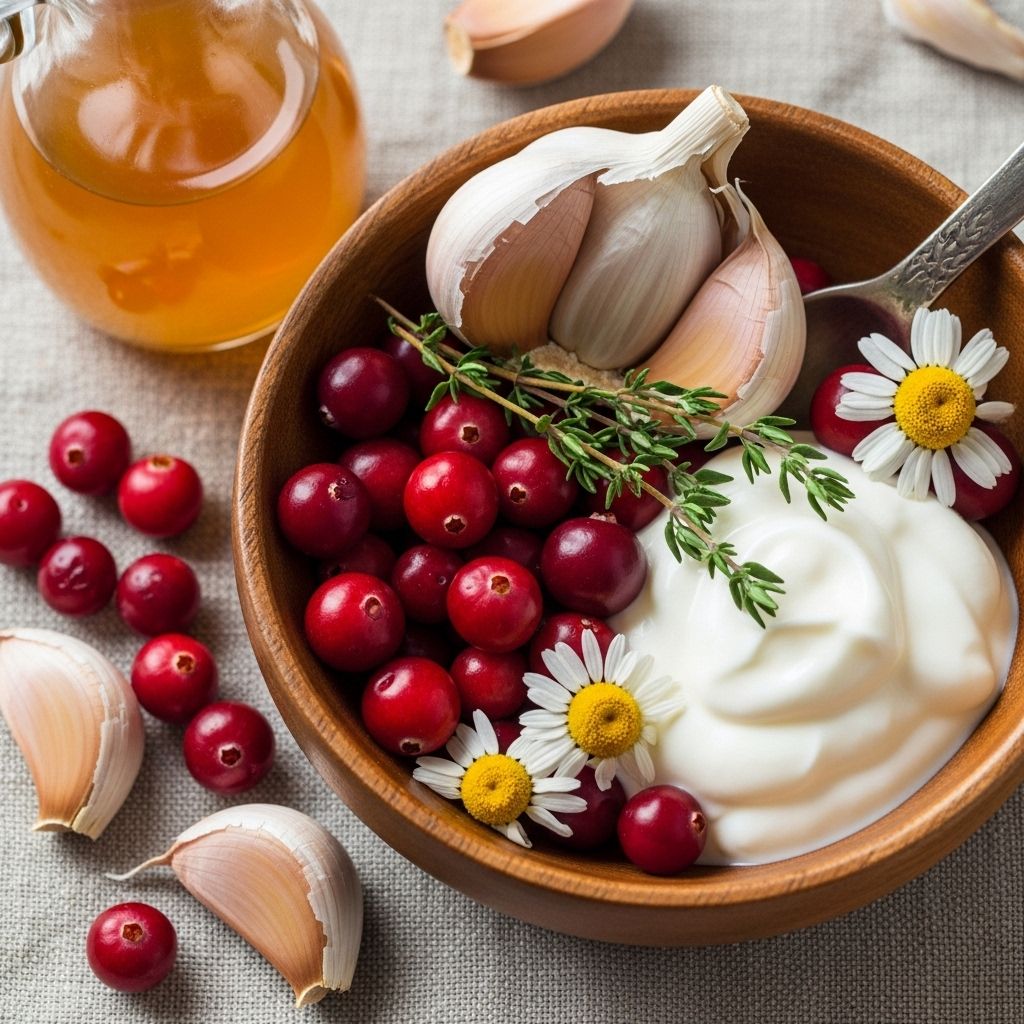Natural Remedies for Yeast Infections: Relief and Prevention
Discover the Power of Natural Remedies for Yeast Infections

Yeast infections, caused by an overgrowth of *Candida albicans*, can be uncomfortable and recurring. While traditional antifungal medications are effective, many people turn to natural remedies for relief. Here, we explore the most effective home treatments and prevention methods.
Table of Contents
Home Remedies for Yeast Infections
Home remedies offer a gentle approach to managing yeast infections. Here are some of the most commonly used natural treatments:
- Boric Acid: Known for its antifungal properties, boric acid suppositories are often used to treat recurrent yeast infections. However, it should be used with caution and never ingested due to its toxicity. Pregnant women should avoid using boric acid altogether.
- Probiotic Supplements and Yogurt: Probiotics, such as *Lactobacillus acidophilus*, promote a healthy balance of bacteria in the body. Consuming probiotic-rich foods like yogurt can help maintain vaginal health, though applying it directly to the affected area is also a common practice. Greek yogurt is particularly effective due to its probiotic content.
- Tea Tree Oil: This essential oil has antifungal properties and can be applied topically when diluted with a carrier oil like olive or coconut oil. However, it should not be ingested due to its toxicity.
- Garlic: Adding more garlic to your diet may help combat *Candida* overgrowth. However, it’s not recommended to apply garlic directly to the vagina due to potential irritation.
- Coconut Oil: Coconut oil has antifungal properties and can be soothing for itching and irritation associated with yeast infections.
- Apple Cider Vinegar: Used in a warm bath, apple cider vinegar can help balance the pH of the vagina and reduce yeast overgrowth. However, it should be diluted to avoid irritation.
- Oregano Oil: Though not as widely used as other remedies, oregano oil contains carvacrol, which has antifungal properties. However, its effectiveness against *Candida* is not well-documented.
Best Practices for Using Home Remedies
While home remedies can provide relief, it’s crucial to consult with a healthcare professional before starting any new treatments, especially if you have underlying health conditions or if symptoms persist.
Prevention Strategies
Preventing yeast infections involves maintaining a healthy balance of bacteria in the vagina. Here are some strategies to help prevent recurrent infections:
- Stay Hydrated and Wear Breathable Clothing: Keeping your genital area clean and wearing breathable underwear can help prevent moisture buildup, which fosters yeast growth.
- Monitor Sugar Intake: Sugar can fuel yeast overgrowth, so reducing sugar intake may help prevent infections.
- Avoid Douching: Douching can eliminate beneficial bacteria, making you more susceptible to infections.
- Practice Good Hygiene: Avoid sharing personal care items and use gentle cleansers to maintain vaginal health.
Frequently Asked Questions (FAQs)
Q: Are natural remedies effective for curing yeast infections?
A: While natural remedies can provide relief and help manage symptoms, their effectiveness in completely curing yeast infections varies. Antifungal medications are generally considered more effective for treating severe infections.
Q: Can I use boric acid if I am pregnant?
A: No, pregnant women should not use boric acid due to its potential toxicity and risk of harm to the unborn child.
Q: How long does it typically take for natural remedies to show results?
A: The time it takes for natural remedies to show results can vary depending on the severity of the infection and individual response. Some people may notice improvements within a few days, while others may require longer treatment.
Q: Should I consult a healthcare provider before using natural remedies?
A: Yes, it is advisable to consult with a healthcare provider, especially if you have a history of infections or other health conditions. They can help you choose the best treatment option and ensure safety.
Conclusion
Natural remedies offer a gentle approach to managing yeast infections, but it’s essential to use them judiciously and consult with a healthcare professional if symptoms persist. By combining these remedies with good hygiene practices and healthy lifestyle choices, you can help reduce the frequency of yeast infections and maintain overall vaginal health.
References
- https://asktia.com/article/home-remedies-yeast-infection-symptoms/
- https://www.healthline.com/health/womens-health/yeast-infection-home-remedy
- https://www.evvy.com/blog/home-remedies-for-yeast-infections
- https://www.webmd.com/women/remedies-yeast-infections
- https://www.medicalnewstoday.com/articles/317935
- https://www.ncbi.nlm.nih.gov/books/NBK543219/
- https://health.clevelandclinic.org/do-home-remedies-actually-work-for-yeast-infections
- https://www.mayoclinic.org/diseases-conditions/yeast-infection/diagnosis-treatment/drc-20379004
Read full bio of Sneha Tete












